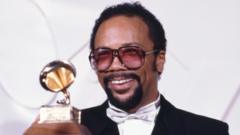Quincy Jones, who defied the odds after a life-threatening brain aneurysm in 1974, is remembered not only as a musician but as a pioneer in the music industry. His tribute concert went ahead despite his unexpected recovery, with icons like Richard Pryor and Marvin Gaye celebrating his contributions to music. By the age of 41, Jones’s versatility had already left a profound impact on jazz, soul, swing, and pop, cementing his reputation across genres.
Growing up in the depths of the Great Depression in Chicago, Jones was inspired by his turbulent surroundings, initially drawn to a life of crime. He recounts a formative moment from his childhood when he discovered a piano in a community center, realizing it was his true calling. This passion for music fueled his career, and by 14, he was already collaborating with legends like Ray Charles and Billie Holiday.
His rise to prominence continued as he became the first African-American vice-president at Mercury Records and produced chart-topping hits like "It's My Party". His fruitful collaboration with Frank Sinatra further solidified his status in the industry, leading to a series of high-profile arranging and production gigs that would define his career.
Quincy Jones's prowess peaked during his partnership with Michael Jackson, leading to the monumental success of "Thriller", a groundbreaking album that blended R&B and pop to perfection and shattered sales records. His ability to identify and cultivate talent allowed him to produce some of the biggest hits of the 1980s, including the charity anthem "We Are the World".
Aside from music, Jones was a fervent social activist, participating in civil rights initiatives and establishing the Quincy Jones Listen Up Foundation to support various causes. His dedication extended to fostering new talent in hip-hop and addressing violence in the genre, displaying his commitment to using music as a catalyst for change.
Despite personal challenges, including health issues stemming from a rigorous lifestyle, Jones's spirit remained unyielded. He married three times and had seven children, passing eventual wisdom from his experiences down to future generations of artists.
Jones's recent passing at the age of 91 has left an indelible void in the music community, with tributes pouring in from artists inspired by his legacy. Should another memorial concert arise, it would undoubtedly gather a plethora of stars to honor a man whose influence transcended music, uniting cultural and social realms through greater understanding and collaboration.
Growing up in the depths of the Great Depression in Chicago, Jones was inspired by his turbulent surroundings, initially drawn to a life of crime. He recounts a formative moment from his childhood when he discovered a piano in a community center, realizing it was his true calling. This passion for music fueled his career, and by 14, he was already collaborating with legends like Ray Charles and Billie Holiday.
His rise to prominence continued as he became the first African-American vice-president at Mercury Records and produced chart-topping hits like "It's My Party". His fruitful collaboration with Frank Sinatra further solidified his status in the industry, leading to a series of high-profile arranging and production gigs that would define his career.
Quincy Jones's prowess peaked during his partnership with Michael Jackson, leading to the monumental success of "Thriller", a groundbreaking album that blended R&B and pop to perfection and shattered sales records. His ability to identify and cultivate talent allowed him to produce some of the biggest hits of the 1980s, including the charity anthem "We Are the World".
Aside from music, Jones was a fervent social activist, participating in civil rights initiatives and establishing the Quincy Jones Listen Up Foundation to support various causes. His dedication extended to fostering new talent in hip-hop and addressing violence in the genre, displaying his commitment to using music as a catalyst for change.
Despite personal challenges, including health issues stemming from a rigorous lifestyle, Jones's spirit remained unyielded. He married three times and had seven children, passing eventual wisdom from his experiences down to future generations of artists.
Jones's recent passing at the age of 91 has left an indelible void in the music community, with tributes pouring in from artists inspired by his legacy. Should another memorial concert arise, it would undoubtedly gather a plethora of stars to honor a man whose influence transcended music, uniting cultural and social realms through greater understanding and collaboration.





















